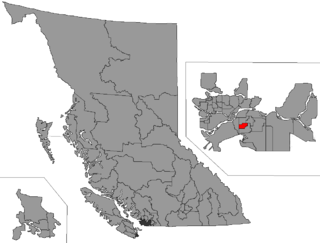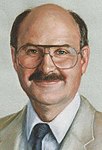The British Columbia Liberal Party is a centre-right provincial political party in British Columbia, Canada. The base of the BC Liberal Party is made up of supporters of both the federal Liberal Party and Conservative Party, and its policies are a mixture of Liberal and Conservative. The party forms the Official Opposition. Andrew Wilkinson became leader of the party on February 3, 2018, after winning the Leadership Election on the fifth ballot, making him the Leader of the Official Opposition of British Columbia.
The New Democratic Party of British Columbia is a social-democratic provincial political party in British Columbia, Canada, which currently governs the province, and previously governed from 1972 to 1975, and then again from 1991 to 2001. Following the 2017 provincial election in British Columbia, the party formed a minority government via a confidence and supply agreement with the British Columbia Green Party, following the defeat of Christy Clark's British Columbia Liberal Party government by a confidence vote in the legislature.
William Nicholas "Bill" Vander Zalm is a politician and entrepreneur in British Columbia, Canada. He was the 28th Premier of British Columbia from 1986 to 1991.

The British Columbia Social Credit Party, whose members are known as Socreds, was the governing political party of British Columbia, Canada, for all but three years between the 1952 provincial election and the 1991 election. For four decades, the party dominated the British Columbian political scene, with the only break occurring between the 1972 and 1975 elections when the New Democratic Party of British Columbia was in power.

The Reform Party of British Columbia is a populist right wing political party in British Columbia, Canada. Although its name is similar to the defunct Reform Party of Canada, the provincial party was founded before the federal party was and it did not have any formal association with it. Their peak of support came in 1996 when they elected two members to the Legislative Assembly of British Columbia.

The British Columbia general election of 1996 was the thirty sixth provincial election in the Province of British Columbia, Canada. It was held to elect members of the Legislative Assembly of British Columbia. The election was called on April 30, 1996, and held on May 28, 1996. Voter turnout was 59.1 per cent of all eligible voters. The election is notable for producing a "false-winner" outcome, rewarding a party that got second in the popular vote with a majority government.
Gordon Wilson is a former provincial politician in British Columbia. He served as leader of the Liberal Party of BC from 1987–1993, leader and founder of the Progressive Democratic Alliance from 1993–1999, before joining the NDP where he served in the provincial cabinet. He also ran as a candidate in the 2000 BC New Democratic Party leadership race. During the 2013 British Columbia provincial election, Wilson endorsed Liberal Premier Christy Clark for re-election over the NDP's Adrian Dix.
The British Columbia Social Credit Party was a conservative political party in the Province of British Columbia, Canada. The provincial Social Credit movement was divided in its early years and was largely under the influence of the Alberta Social Credit League and did not have a functional leadership before 1952.

Greater Vancouver, also known as Metro Vancouver, is the metropolitan area with its major urban centre being the city of Vancouver, British Columbia, Canada. The term "Greater Vancouver" is roughly coterminous with the geographic area governed by the Metro Vancouver Regional District, though it predates the 1966 creation of the regional district. It is often used to include areas beyond the boundaries of the regional district but does not generally include wilderness and agricultural areas within that regional district.

The 38th British Columbia general election was held on May 17, 2005, to elect members of the Legislative Assembly (MLAs) of the Province of British Columbia (BC), Canada. The British Columbia Liberal Party formed the government of the province prior to this general election under the leadership of Premier Gordon Campbell. The main opposition was the British Columbia New Democratic Party, whose electoral representation has been reduced to two MLAs in the previous provincial election in 2001.

The British Columbia general election of 1986 was the 34th general election in the Province of British Columbia, Canada. It was held to elect members of the Legislative Assembly of British Columbia. The sitting Social Credit government was re-elected.
Robert Skelly is a Canadian former politician from British Columbia. He was born April 14, 1943 at New Westminster, British Columbia and worked as a teacher.

Surrey-Newton is a provincial electoral district for the Legislative Assembly of British Columbia, Canada.
The Politics of British Columbia involves not only the governance of British Columbia, Canada, and the various political factions that have held or vied for legislative power, but also a number of experiments or attempts at political and electoral reform.
The British Columbia Recall and Initiative Referendum was a referendum held in British Columbia on October 17, 1991. It was concurrent with that year's general election. The referendum posed two questions. They were on whether elected officials should be able to be recalled and whether voters should be given a citizen's initiative. Both questions were decisively approved with over 80% of the electorate voting yes to both questions.
Wilf Hurd is a Canadian politician from British Columbia. He represented the riding of Surrey-White Rock for the Liberal Party as a Member of the Legislative Assembly of British Columbia, and was an unsuccessful candidate in the 1997 federal election.
The 34th Legislative Assembly of British Columbia sat from 1987 to 1991. The members were elected in the British Columbia general election held in October 1986. The Social Credit Party led by Bill Vander Zalm formed the government. Vander Zalm resigned in 1991 after he was found to have put himself into a conflict of interest; Rita Johnston then became Premier. The New Democratic Party (NDP) led by Bob Skelly formed the official opposition.
Peter Albert Dueck was a politician and cabinet minister in the Canadian province of British Columbia.










